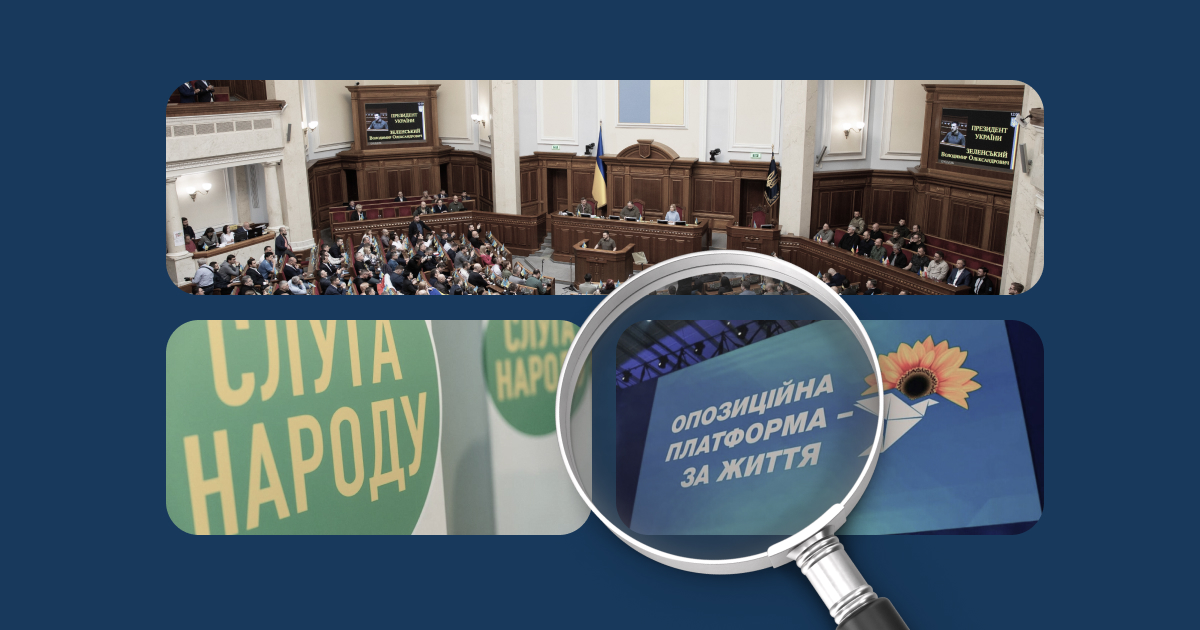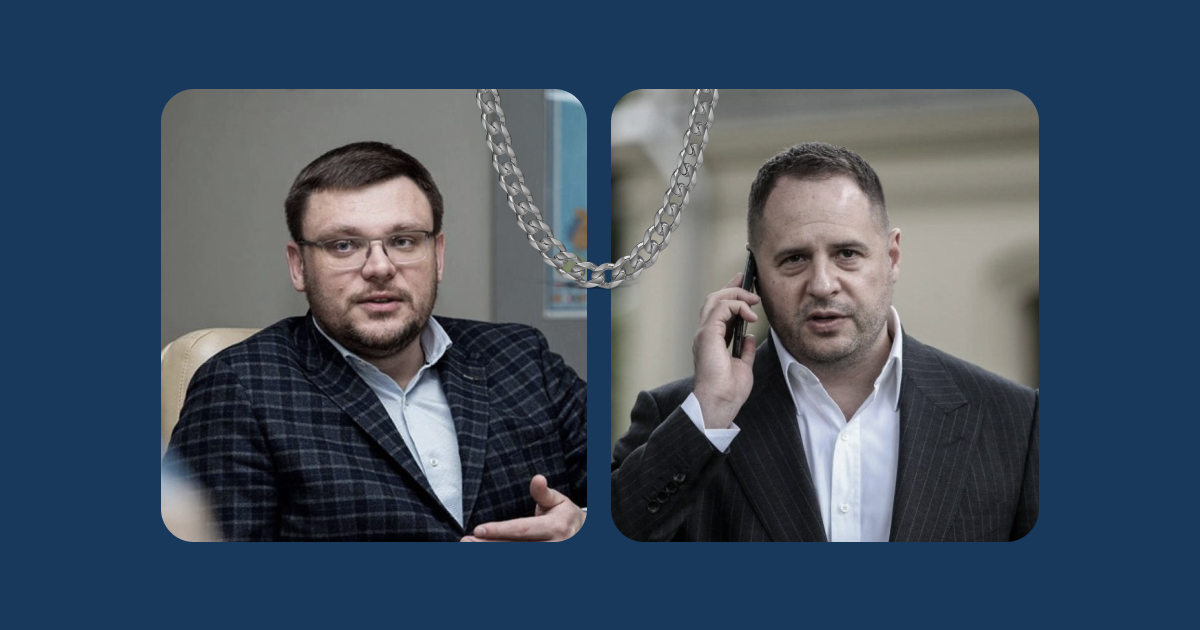How anti-corruption bodies work in Ukraine: explained with examples

Anti-corruption reform began in Ukraine after the Revolution of Dignity. Relevant laws were passed, mandatory electronic declaration of public officials was introduced, and specialised bodies were created to fight corruption: The National Agency on Corruption Prevention (NACP), the National Anti-Corruption Bureau of Ukraine (NABU), the Specialised Anti-Corruption Prosecutor's Office (SAPO) and the High Anti-Corruption Court (HACC).
Since the outbreak of the full-scale war, the authorities have been working on sanctions lists, seizing Russian assets and transferring bail to the Ukrainian Armed Forces.
The number of investigated cases increased after the appointment of Oleksandr Klymenko as the Head of the SAPO last summer. This year, new heads of NABU and HACC were appointed.
In this article, we explain who is responsible for what in the anti-corruption system and how the full-scale war and new appointments have affected the work of the anti-corruption agencies.
NACP
The National Agency on Corruption Prevention was established in 2015. In 2020, Oleksandr Novikov was appointed as the Head of the NACP. The Agency is responsible for developing anti-corruption policy and preventing corruption in Ukraine:
- monitors and verifies declarations of public officials and monitors their lifestyles
Mandatory declarations for officials were temporarily suspended at the beginning of the full-scale invasion. Submission of declarations for 2021 and 2022 is currently voluntary. As of July 3, 388,000 officials had filed their declarations for 2021 and 253,000 for 2022. In total, there are about 700 thousand declarants in Ukraine.
Ukraine pledges to restore mandatory declaration and the NACP's authority to verify declarations. It is one of the conditions for the International Monetary Fund to grant a loan. The relevant law is to be adopted by the end of July 2023. The NACP says that it is fully prepared to resume declaration and verification.
"Many officials think no one can control their assets until the mandatory electronic declaration is resumed. It is not the case. The NACP has a tool to monitor the lifestyle of public servants and officials. Suppose we find a difference between expenses and income, and legal sources cannot explain it. In that case, we draw a reasoned conclusion and send it to law enforcement agencies," Artem Sytnyk, Deputy Head of the NACP, told in an interview with THERE ARE QUESTIONS.
One example of this mechanism is the case of the UAH 10 million estate of Pavlo Khalimon, MP and deputy head of the Sluha Narodu (Servant of the People) faction, which the Prosecutor General's Office registered as a criminal case.
- monitors public officials for conflicts of interest
In 2022, the NACP monitored 438 officials for conflicts of interest. Based on the Agency's findings, seven criminal proceedings were initiated, and 72 administrative reports were drawn up.
In April this year, the NACP reported that Ternopil Mayor Serhiy Nadal had been receiving bonuses for a year and a half that could reach 250% of his official salary. The agency drew up an administrative protocol on the conflict of interest, but the Ternopil City District Court closed the proceedings "due to the absence of administrative offences".
According to the law, the NACP should submit administrative protocols against mayors to courts only where the offence was committed. Similar cases of local courts passing judgement on local authorities have been reported concerning the mayor of Boryspil, the head of the Khmelnytskyi District Council and the mayor of Zhmerynka.
According to the approved State Anti-Corruption Programme for 2023-2025, a draft law is to be prepared to transfer such cases involving conflicts of interest to the High Anti-Corruption Court.
- monitors the financial activities of political parties
Due to the coronavirus pandemic and then the full-scale war, the obligation of parties to submit financial reports has been suspended in Ukraine for three years.
On April 17, 2023, the NACP announced it was resuming control over the political parties' finances.
As early as May, signs of a criminal offence were found in the financing of the Opposition Platform for Life and the Servant of the People. The parties' accounts were funded by individuals who did not have the appropriate income. They probably managed the funds of third parties willing to remain anonymous.

- responsible for the Anti-Corruption Strategy and the State Programme for its implementation
On March 4, the Cabinet of Ministers approved the State Anti-Corruption Programme for 2023-2025, developed by the NACP. The Agency will monitor and evaluate the implementation of the Anti-Corruption Strategy and Programme.
The priority areas include:
- fair trial, prosecution and law enforcement agencies
- state regulation of the economy;
- customs and taxation;
- public and private sectors of the economy;
- construction, land relations and infrastructure;
- defence
- healthcare, education, science and social life.
The NACP called June 28 a "landmark day for all anti-corruption activists". The agency launched an information system for monitoring the implementation of the state anti-corruption policy. Starting from July 1, representatives of anti-corruption bodies will enter data on the programme's implementation.
- identifies corruption risks in legislation and draft laws
In 2022, the NACP monitored 3905 draft laws and acts of the Cabinet of Ministers and conducted 102 anti-corruption examinations.
Since the beginning of the full-scale invasion, the NACP has been working on the War & Sanctions project, a database of people and companies that support Russia's war against Ukraine. The list of international sponsors of the war includes 26 companies, including Xiaomi Corporation, METRO, OTP Bank, Procter & Gamble, Auchan, and Bonduelle.
NABU
The National Anti-Corruption Bureau was established in 2015 to detect, stop and investigate criminal corruption offences committed by public officials.
The NABU's jurisdiction includes specific corruption-related criminal offences, such as misappropriation, embezzlement or acquisition of property through abuse of office, abuse of influence, money laundering, declaration of false information worth more than UAH 5.3 million, and other corruption-related crimes.
The NABU has the right to investigate these crimes when at least one of the conditions is met:
- the crime was committed by high-ranking officials. The full list of positions is available on the NABU website. Corruption offences committed by other officials are investigated by the State Bureau of Investigation and the National Police.
- the value of the object of the crime or the damage caused by it is 500 times or more than the subsistence level;
- when high-ranking officials under NABU's investigation have been offered, promised, given a bribe, or subjected to abuse of influence.

Semen Kryvonos was appointed the Bureau's new director in March this year. Before that, he had been the head of the State Inspectorate for Architecture and Urban Development.
Natalia Sedletska, head of the Skhemy project (Radio Liberty), said that Kryvonos' appointment was supported by the Head of the Presidential Office, Andrii Yermak, two years ago.
Vitalii Shabunin, Head of the Anti-Corruption Action Centre, called the new NABU director "a person with zero experience in investigating corruption and ties to Yermak's deputy".
According to Shabunin, Kryvonos' wife, Halyna Polshynska, was the head of the support department for the First Deputy Head of the Kyiv City State Administration, Oleksii Kuleba, who was appointed Yermak's deputy in January this year. According to Shabunin, Kryvonos also has ties with Kuleba's former business partner at Asper Estate LLC, Tymur Tkachenko, who was the Head of the Kyiv City State Administration's Department of Public Works.
"Does this mean that Kryvonos is 100% controlled by Bankova? No, it doesn't. But it gives rise to reasonable suspicions. For us at the Anti-Corruption Action Centre, this is a reason to continue to closely monitor the work of NABU," Shabunin wrote.
On May 8, the NABU announced its reorganisation. Semen Kryvonos, in his first interview in his new position, said that the strategic goals included increasing the agency's staff by 300 positions, creating an expert institution under NABU, and obtaining an autonomous wiretap.
On May 4, journalist and communicator Olha Komarova announced that she had passed the competition for the position of deputy head of the NABU's external communications department. The Deputy Head of the Bureau, Polina Lysenko, said that Komarova would not work in the position due to reorganisation. Following Komarova's submission, the State Bureau of Investigation registered criminal proceedings against the NABU head and deputy.
The Civil Oversight Council learned about the reorganisation only after the public scandal with Komarova. Before that, the Bureau had not reported any changes. Read more about this in Svidomi's Analytics.
Nevertheless, the NABU continues to operate and investigate corruption cases. The agency works in coordination with the SAPO, so the results of their work should be evaluated together.
SAPO
In 2015, the Specialised Anti-Corruption Prosecutor's Office was established as an independent unit of the Prosecutor General's Office. A SAPO prosecutor is appointed in cases investigated by the NABU. The prosecutor oversees the pre-trial investigation and, upon its completion, submits an indictment to the High Anti-Corruption Court, where he supports the public prosecution.
The SAPO is formed by the Prosecutor General, who determines its structure and staff with the approval of the NABU Director. The Head of the SAPO reports directly to the Prosecutor General and is his deputy.
After the previous head of the SAPO, Nazar Kholodnytskyi, resigned at his request, and the agency worked without a head for almost two years. Former Prosecutor General Iryna Venediktova performed these duties.
The appointment of the head of the SAPO was one of the requirements of the European Commission before the start of negotiations on Ukraine's accession to the EU. In July 2022, Oleksandr Klymenko, who won the competition in December 2021, was appointed to the position, but the Commission kept cancelling and postponing the official announcement of the results.
Klymenko was a NABU detective and investigated the cases of former MP Oleksandr Onyshchenko, former Head of the State Fiscal Service Roman Nasirov, and Deputy Head of the Presidential Office Oleh Tatarov.
The NABU reported that the number of people caught in corruption in the second half of 2022 was a record in anti-corruption agencies' history. One hundred and forty-nine people received suspicions from the NABU and the SAPO, more than in 2021 or 2020. The economic effect of the agencies' activities during this period was almost UAH 1.9 billion.
"The appointment of the Head of the SAPO facilitated this. He, in particular, boosted cases in which evidence was collected in previous periods. This is how the investigation into the Rotterdam+ case was completed; corruption schemes were investigated at PJSC Ukrnafta, JSC Odesa Port Plant, PJSC JSB Ukrgasbank, PJSC CB PrivatBank," the NABU reported.
In 2023, anti-corruption agencies began investigating abuses at the Ministry of Defence, detained acting Minister of Community and Territorial Development Vasyl Lozynskyi, and exposed a criminal organisation headed by the former head of the State Property Fund.
The most high-profile case was the detention of Supreme Court Chief Justice Vsevolod Kniazev for receiving a USD 2.7 million bribe.
"On the one hand, this case is a great shame. On the other hand, it shows that even during the war, the NABU and the SAPO are working and continue to enter any office despite their names and positions," comments Andrii Borovyk, Executive Director of Transparency International Ukraine.
HACC
The High Anti-Corruption Court of Ukraine became operational in 2019 at the latest. Establishing this court was one of the main requirements of the International Monetary Fund for continued cooperation with Ukraine. Judges were selected in an open competition by the High Qualification Commission of Judges together with the Public Council of International Experts.
The HACC considers corruption cases the NABU investigates and makes decisions as a court of first instance and appeal. The list of cases reviewed by the HACC is similar to that of the NABU: corruption, embezzlement of state property, abuse of influence, power or position, misuse of budget funds, bribery of auditors, notaries, and appraisers.
During the full-scale war, the Court seizes and transfers the assets of Russian oligarchs and collaborators to the state. This year, the HACC seized some of the assets of Volodymyr Saldo, Arkadii Rotenberg, Oleg Deripaska and Mikhail Shelkov.
Transparency International Ukraine reports that since February 24, 2022, based on court decisions, the HACC has allocated more than UAH 1.2 billion seized or posted as bail for defence purposes. For example, in April 2022, the Court lifted the seizure of about UAH 170 million, which was used to bribe the NABU and the SAPO leadership and transferred to the Armed Forces.
This year, the Anti-Corruption Court sentenced Yevhen Dykhne, the former head of Boryspil Airport, to five years in prison, remanded Odesa Mayor Hennadii Trukhanov in custody after he was released on bail, arrested former Deputy Prime Minister Andrii Kliuyev in absentia, and remanded the Chief Justice of the Supreme Court in custody with an alternative of UAH 107 million bail.


